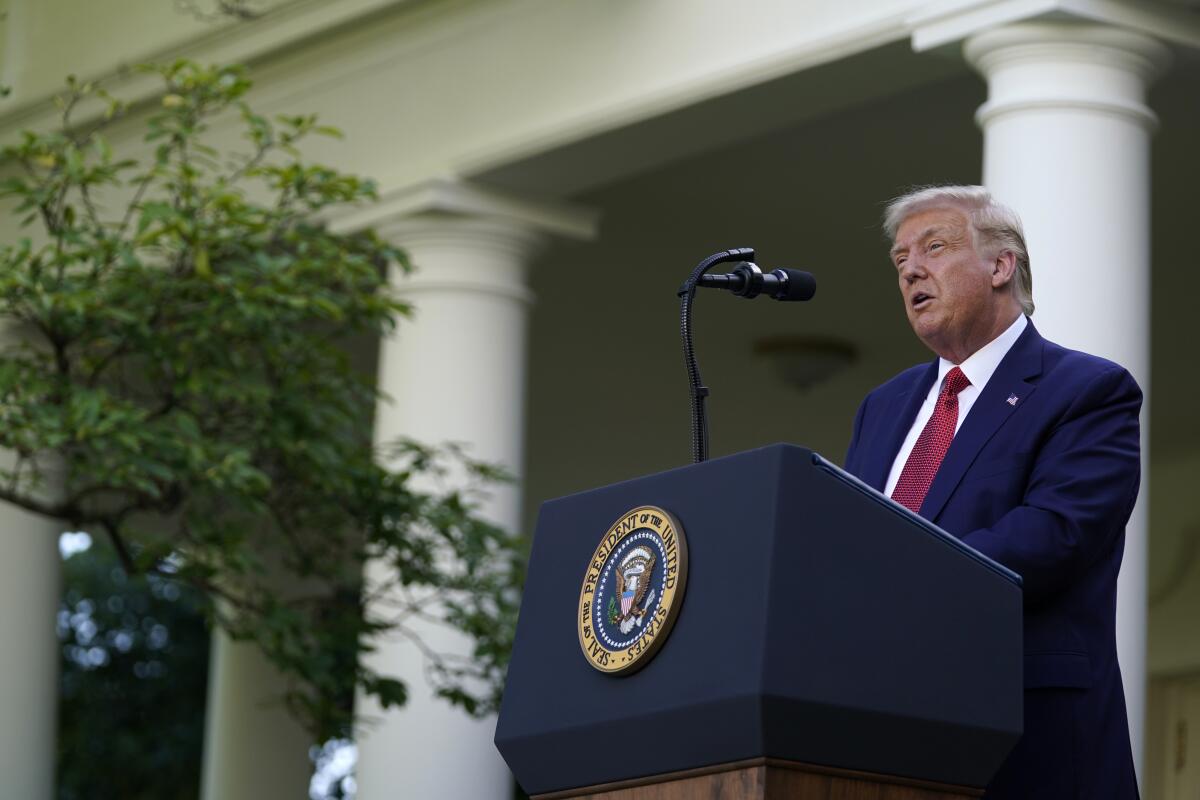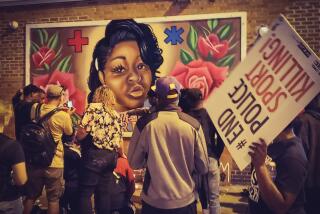Opinion: Pointing out that police also kill white people isn’t a lib-owning comeback

- Share via
Last night Donald Trump, during an interview with Catherine Herridge of CBS Evening News, became visibly upset at a question about why African Americans are dying at the hands of law enforcement.
“So are white people,” he said, looking agitated. “What a terrible question to ask. So are white people. More white people, by the way.”
This is one of those unusual moments when Trump isn’t factually wrong. Police do kill white people, albeit at significantly lower rates than they kill Black and brown people — Black men are about 2.5 times more likely to be killed by police use of force than white men are — but in greater overall numbers. According to one study of 17 states over a three-year period, 52% of people killed by police were white compared with 32% who were Black. (Black victims were also more likely to be unarmed.) But what point is Trump making here? That white victims of police brutality don’t get enough attention? Or, perhaps, that Black victims get too much?
Over the years, the fact that white people also get killed by police has become a fairly common refrain among white conservatives trying to get Black people to stop talking about police brutality. I’ve encountered this statement as an attempted rhetorical checkmate from the All Lives Matter crowd quite a few times on social media. But it’s a point that can be undone (and often is) with a simple question: So why aren’t you mad too?
It’s not a brilliant conservative argument to point out that cops kill white people. It’s not even a logical argument. It only illustrates how broad as well as deep America’s problems with police brutality are.
American police kill civilians at far higher rates than police in other wealthy nations. According to the Prison Policy Initiative, a criminal justice think tank, Americans are killed by law enforcement at rates 3.4 times higher than Canadians and 67 times higher than Brits.
Racism is a major factor in the epidemic of police violence, but it isn’t the only factor. Although it’s impossible to extricate the history of American policing from the history of American racism — some of the earliest police forces grew out of slave patrols — the structural issues in law enforcement are large enough that even the most privileged demographics do not go unaffected. Police in America are often extravagantly armed, trained to think like soldiers and shielded from consequences for their actions. Even if racial bias magically vanished overnight and cops started killing Black people at the same rate they kill white people, there would still be far too many Americans losing their lives at the hands of police. There would still very much be a problem.
But Trump and his ilk care more about refuting the existence of racism than protecting the lives of American citizens. “So are white people,” coming from a president whose favored plan for police reform addresses almost none of protestors’ demands, has nothing to do with concern for the many Americans brutalized by law enforcement and everything to do with taking the focus away from Black people’s calls for change.
“So are white people” echoes the deflective nature of “All lives matter”: These statements are true, but they’re not being offered in good faith. Rather than broadening the debate around police brutality, they seek to preclude a sincere discussion of racism. But racism and police brutality are intertwined issues. Our country can’t address one without addressing the other.
When an interviewer says that Black people are killed by police, suddenly Trump wants us to remember that white people are killed by the police, too. Not because those deaths were also tragic. Not because they exemplify the vast overreach of the police state. Rather, the subtext is always: If white people aren’t complaining, then what are Black people going on about?
Trump relied on a particularly corrosive brand of white identity politics to rally voters in 2016. So far, it seems like he’s trying to pull the same moves in 2020. But arguments along the lines of “Actually, the state kills even more people than my political opponents have been suggesting” do not exactly inspire confidence, especially coming from a man who casts himself as the candidate of “law and order.” In trying to appeal to his base, Trump accidentally proves a point the left has been making for years: Yes, police kill white people as well as Black people. Why haven’t we solved that problem?
More to Read
A cure for the common opinion
Get thought-provoking perspectives with our weekly newsletter.
You may occasionally receive promotional content from the Los Angeles Times.











